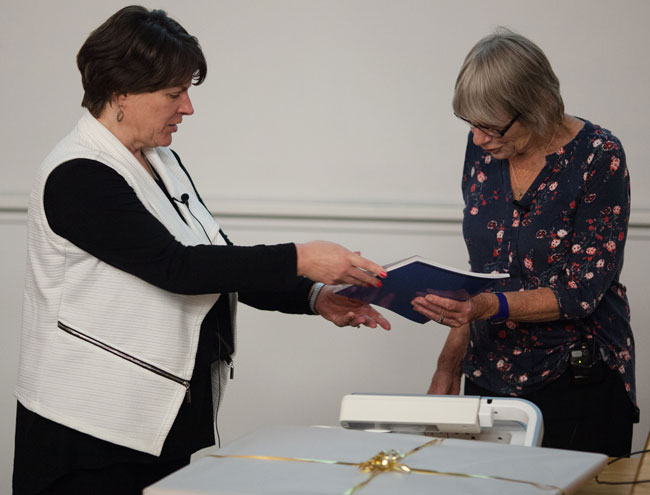
Vice-Chancellor Professor Harlene Hayne presents Professor Christine Winterbourn with her Festschrift book, A Radical Life. Photo: Markus Dagnell.
Scientists from around the world this week celebrated the exceptional career of Professor Christine Winterbourn, whose research in the area of free radical science has spanned more than four decades.
The University of Otago's Christchurch campus hosted a Festschrift for Professor Winterbourn. It also marked the beginning of an international conference of free radical scientists.
Professor Winterbourn says she enjoyed the gathering of so many past students, colleagues and collaborators and listening to them describe their experiences of working or interacting with her over the years. In her Festschrift address, she recounted her memories of the development of the field of free radical biology from its early beginnings, how her work influenced this development, and the pleasure she had derived from her research career.
She said things had changed a lot over the decades of her career.
"Her discoveries have been pivotal in the development of our current understanding of free radical biology and her ideas have influenced the research of numerous scientists ..."
“Nowadays, free radicals and anti-oxidants are terms many people are familiar with as they are often linked to fruit and vegetables and healthy eating. When I first started work on free radicals the term was common in chemistry but the idea that free radicals might have an important role in health and disease was relatively untouched.”
Professor Tony Kettle is a director of the Centre for Free Radical Research and one of the many scientists Professor Winterbourn has mentored.
He says it was essential a Festschrift be held for Professor Winterbourn because of her enormous contribution to science in New Zealand and internationally.
“Professor Winterbourn was one of the first scientists to demonstrate our cells produce free radicals as part of their normal function. Her discoveries have been pivotal in the development of our current understanding of free radical biology and her ideas have influenced the research of numerous scientists in demonstrating the importance of free radical reactions in many common diseases such as cancer, cardiovascular disease and arthritis.”
Professor Kettle says the Festschrift was a great success with speakers all acknowledging Professor Winterbourn's amazing contribution to science. A highlight was the presentation by the Vice Chancellor Professor Harlene Hayne of a book (entitled A Radical Life) containing tributes from more than 50 of her students and colleagues.
In 2011, Professor Winterbourn was awarded the country's top science honour, the Rutherford Medal. She was the first woman to receive the medal in the 20 years it had then been awarded. She has also received the University of Otago Distinguished Research Medal and numerous other national and international scientific awards.
